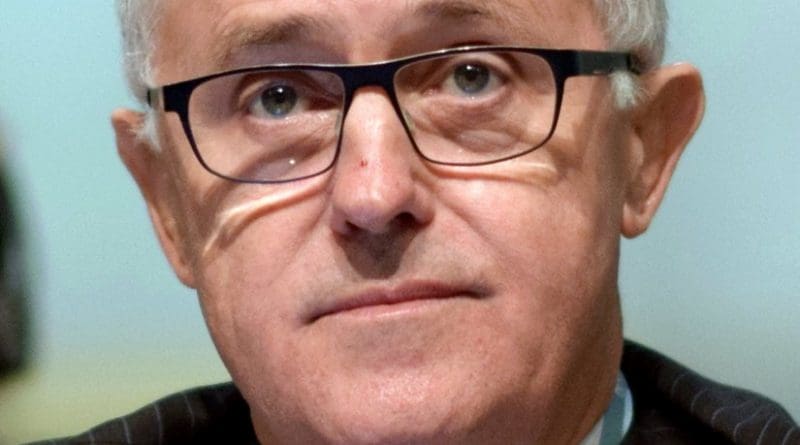America’s Aircraft Carrier: Australian Bases For US Bombers – OpEd
Subservience is a terrible state, not merely because of its indignities, but its distortions. Speech from the main political centre is garbled and marred, ever mediated by the higher power. Media releases from departments from the vassal or satrap state tend to be coloured by the broader interests of the larger power. For years, that has been characteristic of US-Australian relations.
The Australian Prime Minister Malcolm Turnbull was again sallying forth with a whitewashing measure, hoping that no one would notice that Australia was again offering itself up for conspicuous targeting in the event of any future conflict. In February, the Turnbull government had already announced a $140 million package for military expansion that would see a greater reliance on Washington’s good will, and a greater desire to stick its neck out in the event of any conflict with China.
Washington had decided to press its Australian allies on permitting a rotation of bombers at the Darwin and Tindal bases, notably the long-range, nuclear capable B-1B type, in the aftermath of rising tensions in the South China Sea. In 2011, it got Canberra’s acquiescence in increased US troop deployment on Australian soil, a measure that will see US personnel rise to 2,500 in 2017. For all of that, Australians still insist they are not under a benevolent occupation.
According to the neo-conservative American Enterprise Institute’s Michael Auslin, “It is part of an overall rebalancing of military forces to the region.” It continues what is amounting to an increasingly dangerous theatre of demonstrations, with the USS aircraft carrier John C. Stennis along with a cruiser and destroyer stepping up patrols in an effort to maintain freedom of navigation.
Precisely by putting its eggs in this one notable basket of comfort, Canberra has persistently demonstrated its indifference to broader matters in the region. Economically, 60 percent of the country’s trade passes through the South China Sea, while China is Canberra’s biggest trading partner.
Such a deployment does not bother such analysts as Jennifer Harris of the Council on Foreign Relations. Another China-watcher keen to see Beijing as unduly expansionist, Harris insists that the US move and its greater use of Australian soil in the measure “is simply making good on those promises [that further escalation by China] would bring [various consequences].”
While it insists on having good trade relations with China, it also insists on provoking it by happily permitting American military personnel from using its territory. This is not a point that Australian politicians understand. The Australian Northern Territory chief minister Adam Giles gave his “absolute” support for the measure, thinking “the greater level of security we can have in the NT… to protect Australia’s interest and the Territory’s interest, the better.”
At the same time, a blinkered Giles was very aware about commercial interests that did involve a Chinese stake in the territory’s economy, a point demonstrated by the leasing of Darwin Port to a Chinese company, Landbridge, for a 99 year period. “Our number-one priority is to stand up for territorians, particularly to stand up for jobs. We also stand up for investment coming into the Territory, that’s how the Territory has been built in the past.”[1]
As if it mattered, the US ambassador John Berry was asked where the NT port deal with Landbridge fitted in the scheme of Washington’s interests. This curious question arose largely because the State Department had been conducting its own polling through its intelligence and research bureau about Australian opinions on the subject. This point might have bothered the minions in Canberra, but not a peep came out of them.
Notwithstanding that overly keen interest, Berry seemed satisfied that Australia had behaved appropriately. “Australia alone determines its sovereign criteria for investment projects,” came the response in a statement. The concept would be novel to those more familiar with the actual relationship between the US and Australia.
As for the Chinese Foreign Ministry, spokesman Hong Lei advised that, “Any bilateral cooperation must not jeopardise a third party’s interests.” Further to that, the lease need not worry Australians. “This investment by a Chinese enterprise is a normal business operation that complies with market principles, international rules and Australian laws.”[2]
This is well and good, till one realises that the company in question has strong ties to various members of the Chinese Communist party, while the port itself has been used by the Australian navy and the military forces of other countries. Turnbull, in error, suggested in November that it was a purely “commercial port”.[3] It would be good, suggested Luke Gosling, the Labor candidate for the federal seat of Solomon in Darwin, “if the Prime Minister, when coming to the north, knew what he was talking about.”
The US-Australian alliance continues to show itself to be a relationship without reciprocity, one dictated by the absolute needs of one over the misguided, misread needs of another. If Palmerston’s dictum about permanent interests always existing over the notion of permanent friends count in international relations, then things look far rosier to the US establishment than they do to those down under.
Notes:
[1] http://www.australianetworknews.com/nt-bombers-southchinasea/

